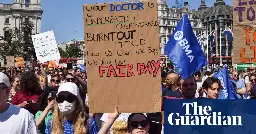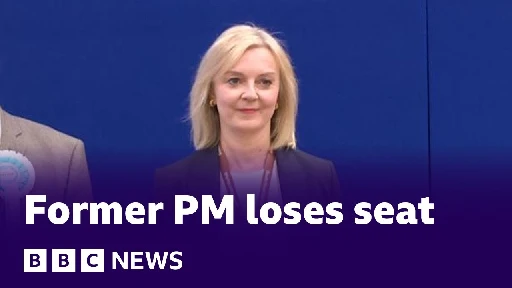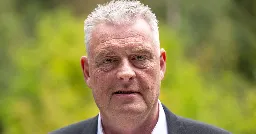
UK Politics
- Tory winter plan could kill thousands, warns top A&E doctorwww.independent.co.uk Tory winter plan could kill thousands, warns top A&E doctor
Exclusive: Frail elderly and mentally ill will suffer most this winter, warns Dr Adrian Boyle
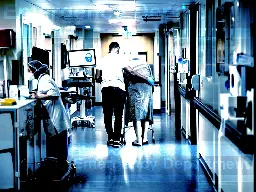
- Polling is ruining politicswww.newstatesman.com Polling is ruining politics
Instead of substantive discussions about policy, elections are reduced to game theory.

- Mortgage pain for 4 million as next interest rate rise looms but UK could be nearing 5.75% peakinews.co.uk Mortgage pain for 4 million as next interest rate rise looms but UK could be nearing 5.75% peak
Many are hopeful that the ongoing cycle of rising interest rates is reaching an end as inflation across the UK begins to fall

- Labour attacks 'abysmal' figures showing just 5.7% of crimes solved last yearnews.sky.com Labour attacks 'abysmal' figures showing just 5.7% of crimes solved last year
The government says communities are safer than when it came to power 13 years ago, with the policing minister accusing Labour of being "soft on crime and soft on criminals".

- Plan to expand North Sea oil drilling announced - as critics slam Rishi Sunak's 'culture war on climate'news.sky.com Rishi Sunak stands by oil drilling expansion as critics warn of climate consequences
The prime minister insists plans to grant over 100 new licences off the coast of Scotland are "entirely consistent" with the government's net zero goals. But one of his MPs warns he will be on "the wrong side of history".

- Customers withdraw record amount of savings in Maywww.bbc.co.uk Customers withdraw record amount of savings in May
People withdraw £4.6bn from accounts in May - the highest on record, Bank of England data shows.

- Government plan to send some asylum seekers to Rwanda is unlawful, Court of Appeal rulesnews.sky.com Rwanda deportation ruling to be appealed by government at Supreme Court
The Court of Appeal has ruled that Rwanda is not a safe third country for migrants to be deported to.
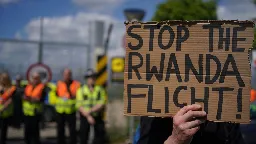
- Can Labour afford to be ambitious?www.newstatesman.com Can Labour afford to be ambitious?
As the era of cheap money ends, the party needs to get radical on tax.
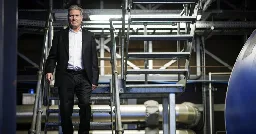
- Why are UK telecoms firms imposing inflation-busting bills?www.theguardian.com Why are UK telecoms firms imposing inflation-busting bills?
Exclusive: Ofcom is facing calls to intervene after companies pushed through prices rises of up to 17% this year

- Britain’s house price crash ‘will be the worst in the world’www.telegraph.co.uk Britain’s house price crash ‘will be the worst in the world’
Downturn expected to be longest in the West as interest rate rise hammers mortgage market

https://web.archive.org/web/20230626125755/https://www.telegraph.co.uk/property/house-prices/britain-house-price-crash-will-worst-in-world/
- Stephen Lawrence: BBC names new suspect in UK's most notorious racist murderwww.bbc.co.uk Stephen Lawrence: BBC names new suspect in UK's most notorious racist murder
Evidence about Matthew White, now dead, implicates other suspects and reveals more police failings.
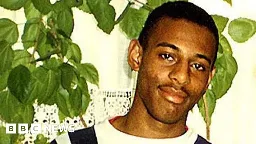
- NHS plans: Sunak says expansion means 'more doctors, nurses, and GPs'www.bbc.co.uk NHS plans: Sunak says expansion means 'more doctors, nurses, and GPs'
The plan to reform NHS training and recruitment comes at a time of record-high waiting lists.
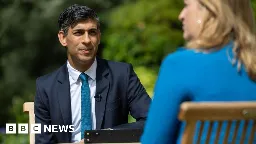
- NHS trailing behind other major nations on life expectancy, study findsnews.sky.com NHS trailing behind other major nations on life expectancy, study finds
Researchers warn Britain's poor performance across several different major disease groups and health conditions including cancer, heart attacks and strokes - judged by preventable deaths - should be a serious concern for political leaders and policymakers.
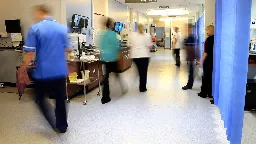
- NHS’s mounting failures and political neglect laid bare in sobering reportwww.theguardian.com NHS’s mounting failures and political neglect laid bare in sobering report
With its 75th anniversary fast approaching, the UK health service is ‘not by any means where it should be’, thinktank concludes

- Disruptive behaviour leaves excluded pupils’ units in England ‘full to bursting’www.theguardian.com Disruptive behaviour leaves excluded pupils’ units in England ‘full to bursting’
Referral unit providers warn of overwhelming demand from unprecedented poor behaviour after pandemic lull

- Union fury as figures show pay rises among top earners driving inflationwww.theguardian.com Union fury as figures show pay rises among top earners driving inflation
The best paid have had the highest wage hikes, but the majority of the workforce has seen salary growth fall, according to ONS data
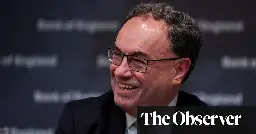
- Mortgage crisis: PM and chancellor face conundrum as rates rise - and there's no silver bullet to end the crisisnews.sky.com Mortgage crisis: PM and chancellor face conundrum as rates rise - and there's no silver bullet to end the crisis
Sky's Ian King explains the possibilities as the government seeks ways to support hard-pressed borrowers without stoking the inflation problem further.

- Mortgage holders to get 12-month grace period before repossessions amid interest rate hikenews.sky.com Mortgage holders to get 12-month grace period before repossessions amid interest rate hike
Jeremy Hunt met with banking bosses in Downing Street, where it was agreed what action would be taken to help mortgage holders as interest rates keep going up. Some of the measures are similar to what was put in place during the pandemic.
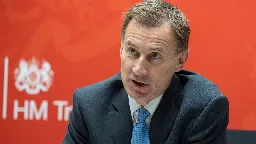
- Can Labour really save the Union?www.newstatesman.com Can Labour really save the Union?
For some Scots, a Starmer government will be their last shot at making the UK work.
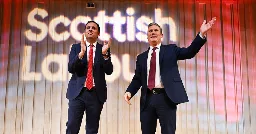
On Saturday, what’s left of the SNP will gather in Dundee for its long-awaited Convention on Independence. After a punishing few months the bruised and the battered, the halt and the lame, will hobble towards Caird Hall to discuss how to get their foundational objective back on track.
A version of this conference was planned under Nicola Sturgeon in order to rubber stamp her plan to treat next year’s general election as a “de facto” referendum. That idea – which most people think is a bad one – disappeared with her resignation. The task facing the Nats this weekend is considerably more complex and challenging than it was at the height of the former first minister’s pomp.
You wouldn’t necessarily know this to listen to the top man. Humza Yousaf, Sturgeon’s successor, insisted this week that he would be the leader to deliver independence: a bold and perhaps delusional statement given his party’s seemingly inexorable decline in the polls, and his inability so far to build much personal credibility among the Scottish people.
All the stops are being pulled out in Dundee. Yousaf will speak, as will the internally popular John Swinney, for so long the Bert to Sturgeon’s Ernie. Kate Forbes, narrowly beaten by Yousaf for the leadership and then constructively dismissed by him, is not trusted to give an address – what if she mentioned public sector reform? What if she talked about economic growth? – but is clearly too notable to be left out entirely. She will instead chair a discussion between independence-supporting hacks, which is probably safe enough. The day will end with a rousing call to arms from the deputy leader Mhairi Black, the SNP’s John Prescott. There is no role for the two most significant figures in recent SNP history: Sturgeon is still too closely linked to the police investigation into party finances, while Alex Salmond is of course no longer a member.
The nationalists face a dilemma. Although polls show the party’s popularity is beginning to tumble through space, and tens of thousands of members have quit, support for independence remains at a steady 45 per cent. Voters who backed the SNP in recent years are switching to Labour ahead of next year’s general election, seizing the opportunity to expel the Conservatives from office. Amid a cost-of-living crisis and an NHS crisis, independence is well down the electorate’s priority list.
There must be a risk that a vote for Labour becomes habit-forming – it will be the first time some Scots have done so for many elections, and they might feel quite good about it. If the “time for a change” sentiment becomes infectious, 19 years of underwhelming SNP rule could be ended at the Holyrood election in 2026.
Yousaf has just over a year to arrest the drift to Keir Starmer’s Labour, but it’s hard to spot any emerging policies or insights that might help achieve that. Most of the First Minister’s energy is focused on cleaning up the mess left behind by Sturgeon. He is therefore trying to shore up the base by reaffirming his commitment to independence: the convention will be followed by a “summer programme of independence campaigning activity, including leafleting, canvassing and regional assemblies”. There will also be more in the rambling series of independence papers being tossed out by civil servants. All roads lead to the SNP’s annual conference in October, which “will officially decide our independence strategy”.
It remains to be seen what impact all this effort will have. My impression – and the polls seem to support it – is that only the SNP hardcore is interested in talking about independence at present. It’s a monomania that looks increasingly out of line with the public interest and indeed the public’s interest, the sign of an exhausted party retreating behind the compound walls. But what is the SNP without its singular obsession?
Scottish Labour, meanwhile, is on the rise. A poll last weekend put the party on course to win more Westminster seats than the Nats, which will have sent a jolt of adrenaline through leader Anas Sarwar and his team. The view inside Labour is that Yousaf is a man slipping off a cliff, scrabbling hopelessly for the rocks around him. Sarwar intends to step on his fingers.
This, then, is a moment of hope – at long last – for those who are either opposed to or unpersuaded by independence. Even the Scottish Tories seem quite pleased. As ever, though, wisdom dictates that optimism in the short term should be coupled with a dose of longer-term pessimism.
The SNP deserves a period in opposition due to its longevity in office – and it will probably get one. The party will then have two choices. It can either spend years arguing about the minutiae of independence and denouncing the faithless electorate, or it can do what the other parties tend to do when they lose power after a period of hegemony: rethink from the ground up.
You can’t come back with the same old people making the same old offer. It’s not what Tony Blair did in 1997, and it’s not what Keir Starmer is offering now. It’s not what David Cameron did in 2010. Accept that an era has passed and that fundamental reconstruction is required at the policy and strategy levels. This was the analysis applied by Salmond before he took the SNP to power in 2007, and the same needs to happen again. It will require a rediscovery of patience, strong internal challenge and probably better brains than are currently at the party’s disposal. Where are its Blairs and Mandelsons and Campbells? Where are its Camerons and Osbornes and Goves? I’m sure the suggestion rankles, but these are the kind of figures you need.
For Labour’s part, pessimism matters because the Nats might get it right. For some Scots, a Starmer government will be their last shot at making the Union work. There are expectations attached to their vote, which do not align with his Tory-lite policies on immigration and Brexit. They understand Labour must compromise to win, but they will expect to see progressive movement in these areas following victory. They will want to see that Britain is not a country locked into inevitable decline, where the weakest suffer the most. And they will expect a better, more constructive relationship between Westminster and Holyrood. If Labour fails, the Union may yet founder.
Starmer’s repeated trips north of the border suggests he gets this in principle, at least. But he will ultimately be judged by Scots on what he does in the years ahead, rather than what he is saying now.
- Jeremy Hunt meets bank bosses as mortgage crisis worsenswww.thetimes.co.uk Jeremy Hunt cuts bank deal to ease mortgage pain for householders
Jeremy Hunt is meeting high street lenders this morning in Downing Street amid growing pressure on the government to offer support for mortgage holders affected by rising interest rates.The chancellor has ruled out a direct bailout to homeowners warning that it could exacerbate inflation. But he is
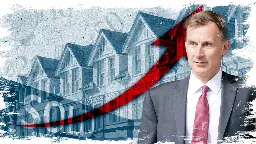
Jeremy Hunt is meeting high street lenders in Downing Street amid growing pressure on the government to offer support for mortgage holders affected by rising interest rates.
The chancellor has ruled out a direct bailout to homeowners warning that it could exacerbate inflation, but he is likely to urge banks to relieve mortgage holders saddled with thousands of pounds in additional repayments.
One of the options set to be discussed would involve banks offering a holiday to mortgage holders, whereby their credit rating would not be hit if they temporarily switched to interest-only payments — something Labour has been calling for.
Harriet Baldwin, chairwoman of the Treasury committee, said banks should be obliged to show “forbearance” to people affected by the sharp rises in interest rates.
She said the Financial Conduct Authority, the banking regulator, needed to be “pretty rigorous” in holding banks to account amid questions over the gaps between interest rates offered to savers and those charged to borrowers.
She said homeowners should be able to have a “grown-up conversation” with their lender to discuss “a variety of things that they will do to help you through what is clearly going to be a difficult period”.
“One of the things we wrote to the regulator, the Financial Conduct Authority, about is making the changes that are necessary to put in, to almost enshrine in their rulebook the kind of forbearance that people were shown during the pandemic,” she told Today on BBC Radio 4.
The Bank of England raised interest rates to their highest level in over a decade yesterday. The Bank’s nine-strong Monetary Policy Committee (MPC) voted to increase rates by 0.5 per cent to 5 per cent in a move that will cost homeowners with variable and tracker mortgages an average of £600 more a year.
The cumulative effect of recent rate rises means that those not on a fixed rate are now typically paying about £6,300 more annually for their mortgage than they were two years ago.
Economists believe interest rates will have to climb to 6 per cent by the end of the year — the highest level since 2000 — to bring inflation back to the government’s 2 per cent target.
Andrew Bailey, the Bank governor, told workers they should not expect pay rises to keep pace with the rising cost of living, saying that inflation-level settlements were “unsustainable”.
The MPC’s move piles pressure on Rishi Sunak with less than 18 months left until a general election. Labour said that “next month it’s going to feel a lot worse” for millions of homeowners.
The prime minister said he took personal responsibility for the harsh measures needed to bring inflation back under control, saying he was “100 per cent on it”. Sunak admitted at The Times CEO Summit in London that his pledge to halve inflation by the end of the year had “got harder”, but later insisted: “It’s going to be OK.”
He urged voters to “hold me to account” on his progress towards his five priorities “in six months, nine months, a year, year and a half”. At that point, Sunak said, “you can make a judgment about how I’m doing”.
He appeared to rule out tax cuts in the autumn, saying: “It might sound great — ‘let’s cut your taxes over here, let’s spend some more money over there, let’s do massive pay awards for everyone in the public sector’ — it might feel great for a day, for a week, for a month ... pretty quickly it would turn out to have been a really bad idea.”
The prime minister also heaped pressure on supermarkets over high prices, saying that they needed to behave “responsibly and fairly”.
Sir Keir Starmer, the Labour leader, also attended The Times CEO summit. He ruled out offering mortgage holders financial support, saying there were “problems” with the approach advocated by the Liberal Democrats, who have called for a £3 billion support scheme for vulnerable homeowners. “There’s no answer to this that doesn’t go with economic stability,” Starmer said.
The MPC’s base rate increase from 4.5 to 5 per cent was the single biggest jump since February, taking interest rates to the highest level since September 2008. Seven committee members, including Bailey, voted for the increase, while two committee members thought rates should stay unchanged.
- Junior doctors in England to strike for five days from 13 Julywww.theguardian.com Junior doctors in England to strike for five days from 13 July
Strike will be longest single period of industrial action by junior doctors in history of health service
